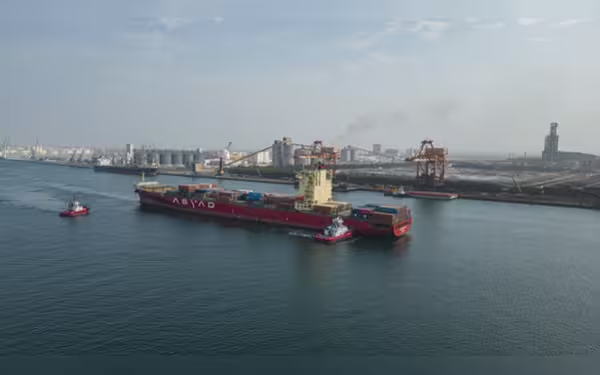Saturday, September 28, 2024 07:21 PM
Oman Aims to Become Global Low-Carbon Fuel Bunkering Hub
- Oman partners with Asyad Group for low-carbon fuels.
- Feasibility study to evaluate low-carbon fuel infrastructure.
- Ports of Salalah and Duqm targeted for upgrades.
 Image Credits: en_prnasisa
Image Credits: en_prnasisaOman, with Asyad Group and partners, aims to lead in low-carbon fuel bunkering, enhancing sustainable shipping practices globally.
In recent years, the global shipping industry has faced increasing pressure to reduce its carbon footprint and embrace sustainable practices. As the world grapples with climate change, the need for low-carbon fuels has never been more urgent. In this context, Oman is stepping up to the plate, aiming to become a key player in the low-carbon fuel bunkering sector. This initiative is spearheaded by the Asyad Group, in partnership with OQ Alternative Energy and Sumitomo Corporation Middle East FZE, who have recently announced a joint study agreement to explore this ambitious goal.
The collaboration marks a significant move towards establishing Oman as a global leader in low-carbon fuels for bunkering. By leveraging the country's abundant renewable resources, the initiative seeks to promote sustainable shipping practices that align with global decarbonization targets. The group has issued a Request For Information (RFI) to leading shipping companies worldwide, inviting them to contribute to the development of green logistic solutions in Oman.
As part of this initiative, a feasibility study will be conducted to evaluate several critical factors. These include the costs associated with delivering low-carbon fuels, the necessary infrastructure to support these operations, and compliance with international regulatory standards for sustainable fuels. Early findings indicate that Oman’s unique geographical position and rich renewable energy resources could enable the country to offer competitively priced low-carbon fuels to the global shipping industry.
The insights gained from the RFI will serve as a foundation for the study, guiding the establishment of a world-class low-carbon bunkering infrastructure in Oman. This development is expected to have a lasting impact on global maritime practices, positioning Oman as a frontrunner in the transition to sustainable shipping.
In alignment with Oman’s Vision 2040 and its sustainable energy strategy, the partners aim to provide low-carbon fuels such as e-methanol and ammonia at competitive prices. The Ports of Salalah and Duqm have been identified as strategic locations for retrofitting existing bunkering facilities to accommodate low-carbon fuel operations. By upgrading these infrastructures, Oman seeks to transform these ports into essential hubs on critical global trade routes.
Ultimately, this initiative not only aims to position Oman as a leader in low-carbon shipping fuels but also supports the growth of the nation’s logistics sector. As the world moves towards more sustainable practices, Oman’s proactive approach could serve as a model for other nations looking to reduce their environmental impact. The journey towards a greener future is a collective effort, and Oman is poised to play a significant role in this global transition.













